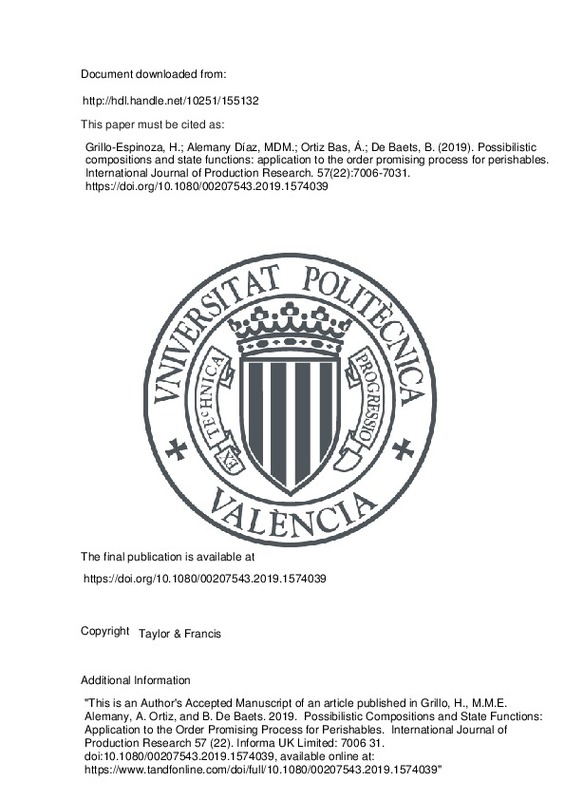JavaScript is disabled for your browser. Some features of this site may not work without it.
Buscar en RiuNet
Listar
Mi cuenta
Estadísticas
Ayuda RiuNet
Admin. UPV
Possibilistic compositions and state functions: application to the order promising process for perishables
Mostrar el registro sencillo del ítem
Ficheros en el ítem
| dc.contributor.author | Grillo-Espinoza, Hanzel
|
es_ES |
| dc.contributor.author | Alemany Díaz, María Del Mar
|
es_ES |
| dc.contributor.author | Ortiz Bas, Ángel
|
es_ES |
| dc.contributor.author | De Baets, B.
|
es_ES |
| dc.date.accessioned | 2020-11-17T04:32:54Z | |
| dc.date.available | 2020-11-17T04:32:54Z | |
| dc.date.issued | 2019-11-17 | es_ES |
| dc.identifier.issn | 0020-7543 | es_ES |
| dc.identifier.uri | http://hdl.handle.net/10251/155132 | |
| dc.description | "This is an Author's Accepted Manuscript of an article published in Grillo, H., M.M.E. Alemany, A. Ortiz, and B. De Baets. 2019. Possibilistic Compositions and State Functions: Application to the Order Promising Process for Perishables. International Journal of Production Research 57 (22). Informa UK Limited: 7006 31. doi:10.1080/00207543.2019.1574039, available online at: https://www.tandfonline.com/doi/full/10.1080/00207543.2019.1574039" | es_ES |
| dc.description.abstract | [EN] In this paper, we propose the concepts of the composition of possibilistic variables and state functions. While in conventional compositional data analysis, the interdependent components of a deterministic vector must add up to a specific quantity, we consider such components as possibilistic variables. The concept of state function is intended to describe the state of a dynamic variable over time. If a state function is used to model decay in time, it is called the ageing function. We present a practical implementation of our concepts through the development of a model for a supply chain planning problem, specifically the order promising process for perishables. We use the composition of possibilistic variables to model the existence of different non-homogeneous products in a lot (sub-lots with lack of homogeneity in the product), and the ageing function to establish a shelf life-based pricing policy. To maintain a reasonable complexity and computational efficiency, we propose the procedure to obtain an equivalent interval representation based on alpha -cuts, allowing to include both concepts by means of linear mathematical programming. Practical experiments were conducted based on data of a Spanish supply chain dedicated to pack and distribute oranges and tangerines. The results validated the functionality of both, the compositions of possibilistic variables and ageing functions, showing also a very good performance in terms of the interpretation of a real problem with a good computational performance. | es_ES |
| dc.description.sponsorship | We would also thank Dr. José De Jesús Arias García for useful discussions during the development of this work. This research has been supported by the Ministry of Science, Technology and Telecommunications, government of Costa Rica (MICITT), through the Program of Innovation and Human Capital for Competitiveness (PINN) (contract number PED-019-2015-1). We acknowledge the partial support of the project 691249, RUCAPS: Enhancing and implementing knowledge based ICT solutions within high risk and uncertain conditions for agriculture production systems , funded by the European Union s research and innovation programme under the H2020 Marie Skłodowska-Curie Actions. | es_ES |
| dc.language | Inglés | es_ES |
| dc.publisher | Taylor & Francis | es_ES |
| dc.relation.ispartof | International Journal of Production Research | es_ES |
| dc.rights | Reserva de todos los derechos | es_ES |
| dc.subject | Composition of possibilistic variables | es_ES |
| dc.subject | State function | es_ES |
| dc.subject | Ageing function | es_ES |
| dc.subject | Order promising process | es_ES |
| dc.subject | Perishability | es_ES |
| dc.subject | Lack of homogeneity in the product | es_ES |
| dc.subject | Uncertainty | es_ES |
| dc.subject.classification | ORGANIZACION DE EMPRESAS | es_ES |
| dc.title | Possibilistic compositions and state functions: application to the order promising process for perishables | es_ES |
| dc.type | Artículo | es_ES |
| dc.identifier.doi | 10.1080/00207543.2019.1574039 | es_ES |
| dc.relation.projectID | info:eu-repo/grantAgreement/EC/H2020/691249/EU/Enhancing and implementing Knowledge based ICT solutions within high Risk and Uncertain Conditions for Agriculture Production Systems/ | es_ES |
| dc.relation.projectID | info:eu-repo/grantAgreement/MICITT//PED-019-2015-1/ | es_ES |
| dc.rights.accessRights | Abierto | es_ES |
| dc.contributor.affiliation | Universitat Politècnica de València. Departamento de Organización de Empresas - Departament d'Organització d'Empreses | es_ES |
| dc.description.bibliographicCitation | Grillo-Espinoza, H.; Alemany Díaz, MDM.; Ortiz Bas, Á.; De Baets, B. (2019). Possibilistic compositions and state functions: application to the order promising process for perishables. International Journal of Production Research. 57(22):7006-7031. https://doi.org/10.1080/00207543.2019.1574039 | es_ES |
| dc.description.accrualMethod | S | es_ES |
| dc.relation.publisherversion | https://doi.org/10.1080/00207543.2019.1574039 | es_ES |
| dc.description.upvformatpinicio | 7006 | es_ES |
| dc.description.upvformatpfin | 7031 | es_ES |
| dc.type.version | info:eu-repo/semantics/publishedVersion | es_ES |
| dc.description.volume | 57 | es_ES |
| dc.description.issue | 22 | es_ES |
| dc.relation.pasarela | S\377838 | es_ES |
| dc.contributor.funder | Ministerio de Ciencia Tecnología y Telecomunicaciones de Costa Rica | es_ES |
| dc.description.references | Grillo, H., M. Alemany, and A. Ortiz. 2016b. Modelling Pricing Policy Based on Shelf-Life of Non-Homogeneous Available-To-Promise in Fruit Supply Chains, 608–617. doi:10.1007/978-3-319-45390-3_52 | es_ES |
| dc.description.references | Steglich, M., and T. Schleiff. 2010. “CMPL: Coliop Mathematical Programming Language.” Technische Hochschule Wildau. doi:10.15771/978-3-00-031701-9. | es_ES |
| dc.subject.ods | 02.- Poner fin al hambre, conseguir la seguridad alimentaria y una mejor nutrición, y promover la agricultura sostenible | es_ES |







![[Cerrado]](/themes/UPV/images/candado.png)

